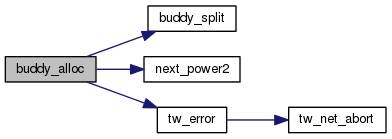Buddy-system memory allocator. More...
#include <sys/queue.h>Go to the source code of this file.
Data Structures | |
| struct | buddy_list |
| struct | buddy_list_bucket |
Macros | |
| #define | BUDDY_ALIGN_PREF (32 - 2 * sizeof(void*) - sizeof(uint32_t) - sizeof(purpose_t)) |
Typedefs | |
| typedef enum purpose | purpose_t |
| typedef struct buddy_list | buddy_list_t |
| typedef enum valid | valid_t |
| typedef struct buddy_list_bucket | buddy_list_bucket_t |
Enumerations | |
| enum | purpose { FREE, USED } |
| enum | valid { VALID, INVALID } |
Functions | |
| buddy_list_bucket_t * | create_buddy_table (unsigned int power_of_two) |
| void * | buddy_alloc (unsigned size) |
| void | buddy_free (void *ptr) |
Macro Definition Documentation
| #define BUDDY_ALIGN_PREF (32 - 2 * sizeof(void*) - sizeof(uint32_t) - sizeof(purpose_t)) |
Typedef Documentation
| typedef struct buddy_list_bucket buddy_list_bucket_t |
Bucket of 2^order sized free memory blocks.
| typedef struct buddy_list buddy_list_t |
Metadata about this particular block (and stored at the beginning of this block). One per allocated block of memory. Should be 32 bytes to not screw up alignment.
Enumeration Type Documentation
Function Documentation
| void* buddy_alloc | ( | unsigned | size | ) |
Find the smallest block that will contain size and return it. Note this returns the memory allocated and usable, not the entire buffer. This may involve breaking up larger blocks.
- Parameters
-
size The size of the data this allocation must be able to hold.
Definition at line 234 of file buddy.c.
References buddy_split(), buddy_list_bucket::count, g_tw_buddy_master, INVALID, buddy_list_bucket::is_valid, next_power2(), buddy_list_bucket::order, tw_error(), TW_LOC, buddy_list::use, and USED.
Referenced by tw_snapshot_delta().


| void buddy_free | ( | void * | ptr | ) |
Free the given pointer (and coalesce it with its buddy if possible).
- Parameters
-
ptr The pointer to free.
Definition at line 137 of file buddy.c.
References buddy_try_merge(), buddy_list_bucket::count, FREE, g_tw_buddy_master, buddy_list_bucket::order, buddy_list::size, TW_LOC, tw_printf(), buddy_list::use, and USED.
Referenced by tw_event_free(), tw_event_rollback(), and tw_eventq_push_list().


| buddy_list_bucket_t* create_buddy_table | ( | unsigned int | power_of_two | ) |
Pass in the power of two e.g., passing 5 will yield 2^5 = 32.
- Parameters
-
power_of_two The largest "order" this table will support.
<Minimum block order
<Minimum block order
<Minimum block order
<Minimum block order
Definition at line 288 of file buddy.c.
References buddy_base_address, BUDDY_BLOCK_ORDER, buddy_list_bucket::count, FREE, INVALID, buddy_list_bucket::is_valid, buddy_list_bucket::order, buddy_list::size, tw_calloc(), TW_LOC, buddy_list::use, and VALID.
Referenced by setup_pes().


 1.8.6
1.8.6